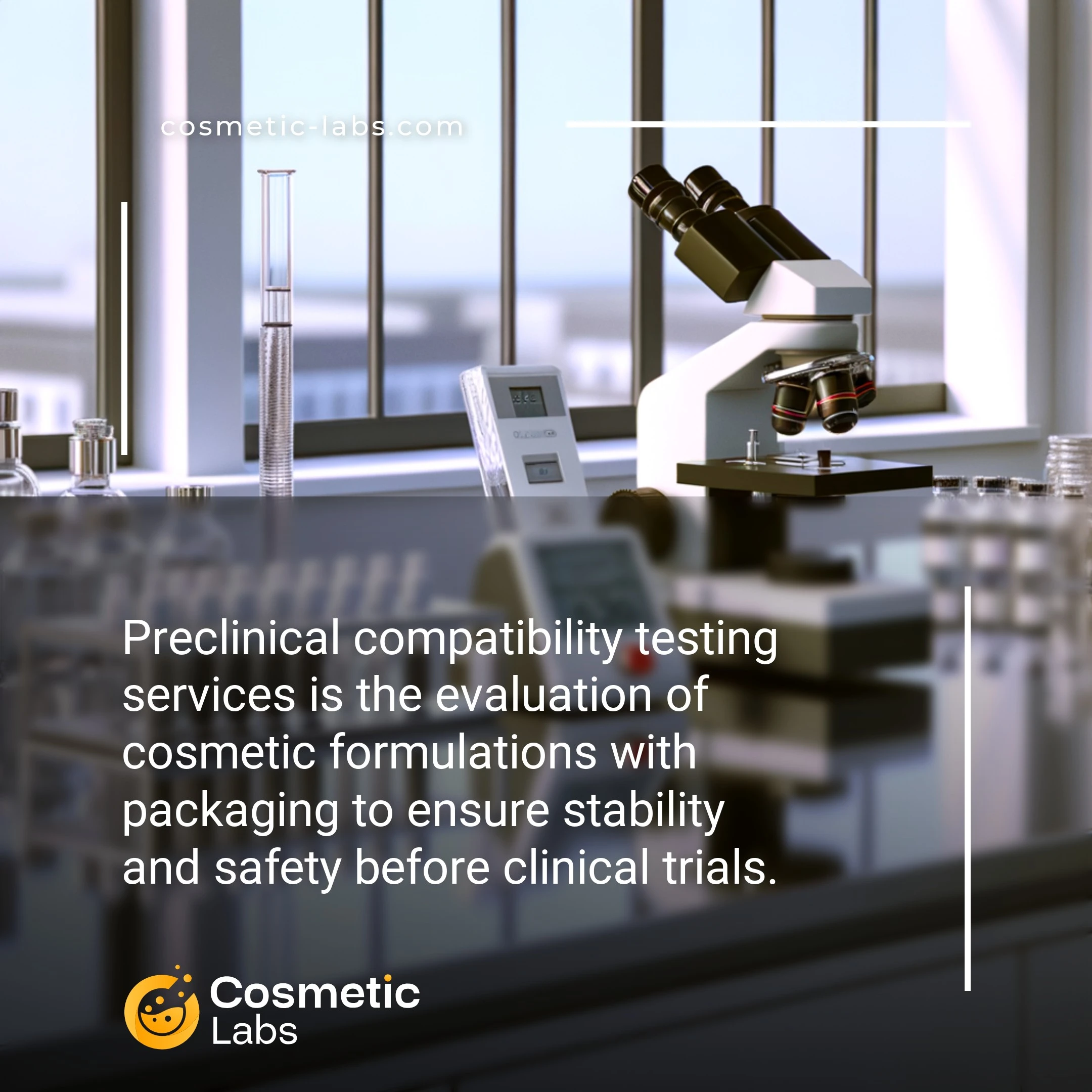Preclinical Compatibility Testing Services for Cosmetic Product Success

What is Preclinical compatibility testing?
Preclinical compatibility testing evaluates how your cosmetic formula interacts with packaging materials (plastics, glass, aluminum, pumps, etc.) before production begins. Our partner labs conduct accelerated stability studies at various temperatures, testing for chemical reactions between your product and container – including leaching, adsorption, discoloration, and material degradation over 3-6 months. This early-stage testing catches packaging-related issues that could otherwise lead to product recalls or customer complaints down the line.
Why do you need this service?
Cosmetic labs apply preclinical compatibility testing to verify your formula works with specific packaging materials before production begins. They test how your serum interacts with glass droppers, whether your cream maintains stability in aluminum tubes, and if your active ingredients remain potent in airless pumps over 12-24 months. This testing prevents costly reformulations and packaging changes after manufacturing starts.
Who provides Preclinical compatibility testing services?
All cosmetic labs providing Preclinical compatibility testing services
There is no company providing these services at the moment.
Preclinical Compatibility Testing for Cosmetic Products
Compatibility testing determines how your cosmetic formula performs with its packaging over time. Labs on our platform test product-package interactions before you invest in production, helping you avoid costly reformulations and recalls.
Standard Compatibility Test Protocols
Testing labs evaluate your formula’s interaction with different packaging materials through accelerated aging studies. They place your product in various containers—glass, plastic, aluminum—and monitor changes at elevated temperatures.
Key tests include:
- Color and odor stability checks
- pH level monitoring
- Viscosity measurements
- Microbial contamination screening
- Active ingredient concentration analysis
Results typically arrive within 4-8 weeks, depending on your stability testing requirements. Labs provide detailed reports showing which packaging materials work best with your specific formula.
Material-Specific Testing Services
Different packaging materials require unique testing approaches. For plastic containers, labs check for chemical migration and stress cracking. Glass packaging gets tested for alkaline leaching that could alter your formula’s pH.
Specialized tests include:
- Plastic resin compatibility (PET, PP, HDPE)
- Metal corrosion assessment for tubes and caps
- Seal integrity for airless pumps
- UV light transmission for clear containers
Testing facilities also evaluate secondary packaging like labels and adhesives. Your product might react with certain inks or glues, causing discoloration or label peeling. Labs help you select materials that maintain product integrity throughout shelf life.
Practical Applications of Preclinical Compatibility Testing
Preclinical compatibility testing prevents product failures before they reach manufacturing scale, saving brands thousands in reformulation costs and protecting market timelines.
Package-Formula Interaction Testing
Labs evaluate how your formula interacts with packaging materials over time. Compatibility testing for cosmetic packaging includes monitoring pH shifts, color changes, and active ingredient stability in different container types. Testing protocols examine glass, plastic, and airless pump systems at various temperatures.
Results predict shelf life accuracy and identify potential reactions between preservatives and packaging components. This data guides material selection and prevents costly packaging switches after production begins.
| Test Parameter | Standard Timeline | Key Indicators |
|---|---|---|
| Physical Stability | 3-6 months | Separation, viscosity changes |
| Chemical Compatibility | 1-3 months | pH drift, discoloration |
| Microbiological Safety | 28 days | Preservative efficacy |
| Active Ingredient Stability | 6-12 months | Potency retention percentage |
Multi-Product Compatibility Assessment
Testing labs examine how products perform when used together in skincare routines. Cross-product compatibility testing reveals potential reactions between serums, moisturizers, and sunscreens applied in sequence. Labs measure pH changes, texture modifications, and efficacy impacts when products layer.
These assessments help brands develop complementary product lines and provide usage guidance to consumers. Testing identifies which ingredient combinations enhance performance versus those that neutralize benefits.
Ready to validate your formulations? Connect with specialized testing labs on our platform to start your preclinical compatibility assessments.